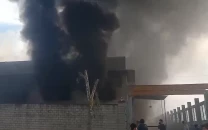Ecological fallout of the floods
Pakistan’s worst floods in living memory were a man-made rather than a natural disaster.

Ecological fallout of the floods
Much has already been written about the timber mafia and its abettors. Not only did their indiscriminate logging reduce the forest cover but hidden timber, dislodged by the torrents, razed houses, buildings and people in its path. Similarly, constructions on river banks were the result of poor urban planning and ultimately caused panic and destruction when the river reclaimed its path.
But, post-flood, the greatest ecological impact is on local biodiversity. In the lower Indus delta, torrential rains have forced animals out from riverine forests. In Rohri, wild boars took refuge in villages only to be shot by the locals whereas in Khyber-Pakhtunkhwa bears driven into the open were narrowly rescued from drowning. The endangered hog deer is now being hunted by poachers and there have been sightings of the Indus dolphin in Sukkur. Unless locals are educated by the wildlife department, these animals face extinction, especially since flooding has caused many male and female pairs to be separated.
The accretion of these small changes in the ecosystem – extinction of animals, mutations of bacteria in the standing floodwater which is likely to cause water and air-borne diseases – eventually leads to massive environmental consequences. So far, there has been no ecological assessment of the floods but, considering that the monsoon rains are expected to be this violent year after year, there is a need for concrete data to prevent a disaster of this magnitude from happening again. It is encouraging that planners in Khyber-Pakhtunkhwa will use data from these floods to plan future bridges, roads and dams. Rehabilitation of flood victims provides an excellent opportunity to dovetail development with ecological needs. There should be a clear understanding of the linkages between ecology, development and rehabilitation.
Published in The Express Tribune, September 20th, 2010.


















COMMENTS
Comments are moderated and generally will be posted if they are on-topic and not abusive.
For more information, please see our Comments FAQ